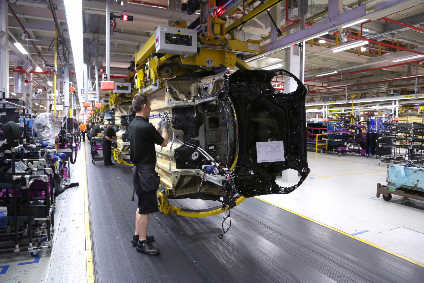
The UK car manufacturing sector has posted its best half-year performance since 2000, with 897,157 cars produced – up 13.0% on 2015. However, the UK’s automotive trade association, the SMMT, voiced concern over the outlook following the recent Brexit vote.
The SMMT said it was the 11th consecutive month of growth in June, with car production up 10.4% to 158,641 units – the highest level for the month since 1998.

Discover B2B Marketing That Performs
Combine business intelligence and editorial excellence to reach engaged professionals across 36 leading media platforms.
However, the SMMT said that future growth is uncertain, as a survey of SMMT members in July highlights industry concerns over future trade and investment following the Brexit referendum vote.
The SMMT noted that exports have driven car output up this year, with year-to-date car exports up 14.9% to 695,139 units, while production for the domestic market grew 7.1%, to 202,018 units.
The majority of the UK’s car exports are bound for the EU countries and the SMMT said that the ‘relationship with our biggest market is now uncertain and, as a survey of SMMT members just published shows, is of significant concern’.
In the SMMT survey, respondents, including businesses of all sizes, from component suppliers to vehicle manufacturers and importers, are most concerned about the potential negative impact of tariffs, custom charges or other barriers between the UK and the EU single market (68.4% concerned).
They also expressed concern about losing access to EU trade deals (66.4%), being bound by regulations in their prime export market over which they have no say (66.1%) and loss of access to the EU-wide skills market (63.6%).
Mike Hawes, Chief Executive, SMMT, said: “UK Automotive is globally competitive with overseas demand for British made products increasing, not least in Europe which is by far our largest market. The latest increase in production output, however, is the result of investment decisions made over a number of years, well before the referendum was even a prospect. These decisions were based on many factors but, primarily, on tariff-free access to the single market, economic stability and record levels of productivity from a highly skilled workforce. To ensure the sector’s continued growth, and with it the thousands of jobs it supports, these must be priorities in future negotiations.”






